I don’t know much about media criticism. I try to read up, to study my heroes’ works on Vulture or Buzzfeed. I watch video essays. I’m learning. But sometimes, you watch something that grips you from the core and yanks you back and all you can think is I need to write about this I need to share this. Recently, these sorts of works have more or less been restricted to “prestige tv”: your Westworlds, your Breaking Bads. But for me, only one genre has the power to truly kick me in the back of the kneecaps anymore: stand up comedy. And just in the last few months, two works of stand up comedy have not only grabbed me, they’ve saved my life: James Acaster’s Repertoire and Hannah Gadsby’s Nanette.
James Acaster is a British comedian specializing in “low-key whimsy,” best known for his jokes about cabbages and ready to eat apricots. I’ve been following his career for about five years now, starting with a set on Russell Howard’s Good News in 2013 where his name was misspelled behind him the entire set.

His award winning series of four comedy specials, Repertoire, went live on Netflix this spring. I watched all four hours once or twice daily for a good two weeks. I kept finding more to get out of it. Acaster mixes normal stand up with non-linear storytelling and unreliable narrators. He begins talking about how he is actually an undercover cop named Pat Springleaf undercover as a stand up comedian named James Acaster, and how his wife left him because he got too caught up in the case. In the next episode, he doesn’t mention any of this, instead focusing on his stint in jury duty and his complex relationship with religion, ending with a five minute long shot of him eating an orange by candlelight. The third episode is centered around “a fresh start” and how a honey-based scam gone wrong has forced him into witness protection. The fourth episode, possibly the most heartbreaking, includes the story of how he became an undercover cop through witness protection and how he met his wife through a game of flirty Twister, and how much he loves her and can’t see the relationship going wrong anytime soon.
It sounds complicated, and it is, but Acaster acknowledges it. In the very first hour, he cracks a joke about how he knows an undercover cop pretending to be a stand up comedian is weird, but “not as weird as a stand up comedian pretending to be an undercover cop! Imagine that LOSER!” The entire narrative is built on a system of deflection and projection, ultimately ending with a story of a duck talking to a decoy about how meaningful his life is, how fascinating higher powers are, in fact, he’s written a series of one-man shows about it. That’s what tips the stories from funny to heartbreaking: that moment you realize “hang on, I think he’s actually talking about himself here” peppered between conventional jokes about Dr. Pepper and secret santas.
The nonlinear storytelling breaks the contract every stand up comedian makes with their audience, the sort of intimacy only one person on a stage can muster. You have to trust them to entertain you, you put your sensibility into their hands. It’s a dangerous thing, laughter: it makes you so vulnerable, you take your guard down in order to laugh but its so easy for a performer to take advantage and punch you in the gut instead.
Jokes have two parts: set ups, and punchlines.
Is the ultimate punchline the lack of one altogether?
Hannah Gadsby is another comedian I have heard so much about. Her work on (possibly the greatest tv comedy of our generation) Please Like Me is phenomenal, and helped me overcome my struggle with self-harm. Her miniseries Hannah Gadsby: Arts Clown, a four part art history lecture for the radio made me feel so smart, though I’m unsure how well radio works as a medium for art lectures. Like Repertoire, Nanette made waves at the Edinburgh Fringe, the festival for experimental one person theatre.
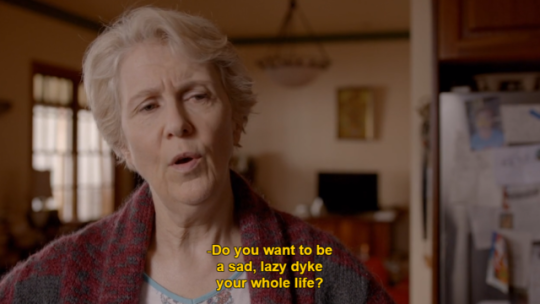
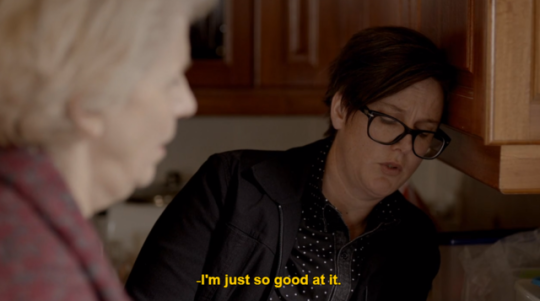
Nanette uses tension the way Repertoire uses nonlinear storytelling. It starts slow, with jokes that make you wonder Wait can I laugh? and builds until Gadsby reaches the crux of her argument: comedy is about tension. But there’s enough tension in the day-to-day existence of a “gender not normal” lesbian that building artificial tension is a futile practice.
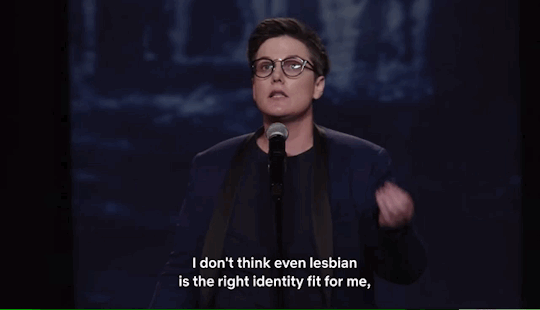
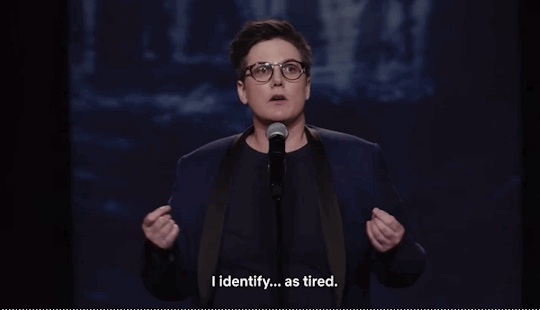
I have to come clean here: I can’t watch Hannah speak on these topics without relating to her personally. She was raised in the extremely homophobic society of late 20th century Tasmania, I was raised in the one-two punch of homophobic societies: the military and the Catholic Church. She’s a lesbian who finds it hard to fit in “with her people.” I’m a genderfluid lesbian-ish person who is dating both a polygender person and a trans man. I don’t know what to call myself. I don’t know where I fit. So when I hear her say:
“I’ve built a career out of self-deprecating humor… and I don’t want to do that anymore. Because do you understand what self deprecation means to someone who already exists within the margins? It’s not humility. It’s humiliation. I put myself down in order to speak. In order to seek permission to speak. And I simply will not do that anymore. Not to myself, and not to anyone who identifies with me.”
Yeah… that hits hard.
Hannah speaks at length about internalized homophobia. There’s no way to effectively explain how it feels to hate the person you are, to hate the person other people think you made yourself into. With Hannah, she sealed off her shame and funneled it into jokes. With me, well, I don’t know. I’m still trying in vain to seal it all in, but in Icarian irony the closer I get to true self acceptance the more that seal melts and leaks and ruins it all again.
But this is a Very Serious Media Criticism Piece.
One of the weirdest similarities between Repertoire and Nanette is the recurring thread of color symbolism. Hannah makes the case for blue to stop being called a masculine color while wearing a blue shirt and blazer, in front of a blue background, while Repertoire exists in a monotone world of olives, mustards, and burgundys through backdrops and various items of corduroy clothing worn by James, making it feel like a living breathing Wes Anderson shot. Until, of course the final episode, Recap, which incorporates all three colors.


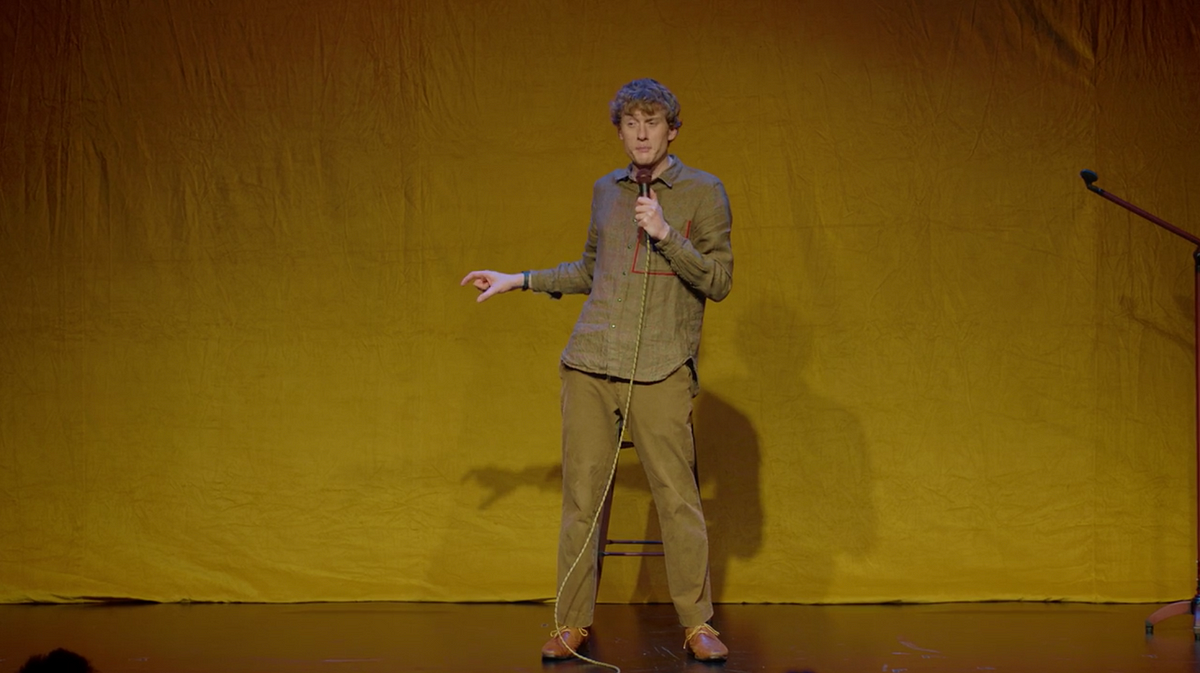

It’s this element that made me stop looking at these works as stand-up comedy and start looking at them through the lens of theatre. I’m 3/4 of the way through a theatre degree, so with my 3/4 of a qualification, I know how to spot when effort is put into the subconscious messages of visuals. There’s more to Repertoire than starting the story at the end and looping around. There’s more to Nanette than deconstructing comedy. Both of these works are about connection. About humanity. When James projects his issues onto an audience member or sings a long winded football chant to one specific man in the front row, he’s sharing his story with people around him. When Hannah corrects her storytelling about a encounter with a violent man, she’s not admitted defeat in comedy. She’s sharing her truth for those in similar circumstances.
That’s a lot of theatre theory to throw onto stand up. Stand up is, by and large, a lowbrow medium. There’s no “Standup History” course at my small women’s college, because if there were I would have taken it already and all my classmates would hate me because of my “enthusiasm.” Laughter is cheap. Art is expensive. Art is honest. Standup is deceptive.
As Gadsby says, in comedy, you can’t end stories where you want to, because you have to end on a laugh. In fact, you don’t have to tell true stories at all. Where Nanette slowly reveals that a story that is told honestly isn’t necessarily the whole picture, Repertoire slowly reveals the nugget of truth in a scenario that is outrageously absurd. Both take the audience by surprise, breaking the contract formed between performer and audience.
Nanette’s preoccupation with identity is reflected mainly through art history, because that’s what Hannah Gadsby got her undergrad degree in. She speaks on the virgin/whore binary, the responsibility of artists to “suffer,” especially in terms of mental illness, and her grudge against Pablo Picasso. Of course, this is not about art. Hannah just uses it because that’s what she knows, just like how I compare plot points in The Bachelorette to David Mamet plays: we’re all slaves to our major.
Every single issue she finds with art is an issue the world finds in her. The pressure on women to become representations of their sexuality, the pressure on mentally ill people to either be normal or make a commodity of their illness, and the toxic masculinity of the entitled man.
When Hannah reveals that her lighthearted story about a man who almost beat her up actually ended with her being beat up, that’s her way of making the audience feel the shame she feels every time she told that joke. They laughed originally, but now, faced with the true reality, they realize that it was her own homophobia that kept her from telling the truth. She refuses to fulfill the job of the comedian to diffuse the tension.
Hannah Gadsby breaks a commandment of comedy: she is angry onstage and she refuses to make herself the butt of the joke or make light of the situation.
She says, to a fully hushed Sydney Opera House, that it would have been more humane to have been killed than to suffer what she suffered in her lifetime.
Her audience is fully disarmed. The intimacy of solo theatre becomes less of a jester show and more of an investigation. And why does she alienate her audience? Because she feels alienated every single day of her life and she’s not sacrificing herself for their humor anymore.
But ultimately, Nanette is for the “normals.” For those who carry that alienation, that shame within us every day, doubling it down is an experience best done once or twice. When I start fantasizing about slicing my breasts off or stabbing myself in my ovary, I don’t want to hear about how I would be better off dead. I reach for the low key whimsy of Repertoire. And that’s okay. It was so important for me to hear Hannah’s story, but it’s not something I want to relive over and over. But what I do want is for everyone in my life to live it. Just for an uncomfortable hour, understand what it feels like to slowly feel the tension marginalized people feel every day.
I don’t know how I’m going to unlearn my self hate. I don’t have the confidence for stand up comedy. I don’t have the skills for media criticism, as I just found out. But I refuse to let others around me put societal pressure on me without empathizing with me. And that’s why I owe my life to Hannah Gadsby. But I also owe it to James Acaster, because until I figure something out, I can always just escape into the ruddy-colored world of Repertoire.
People like me reserve the right to have our pain represented. But we also reserve the right to escape if we need it.
